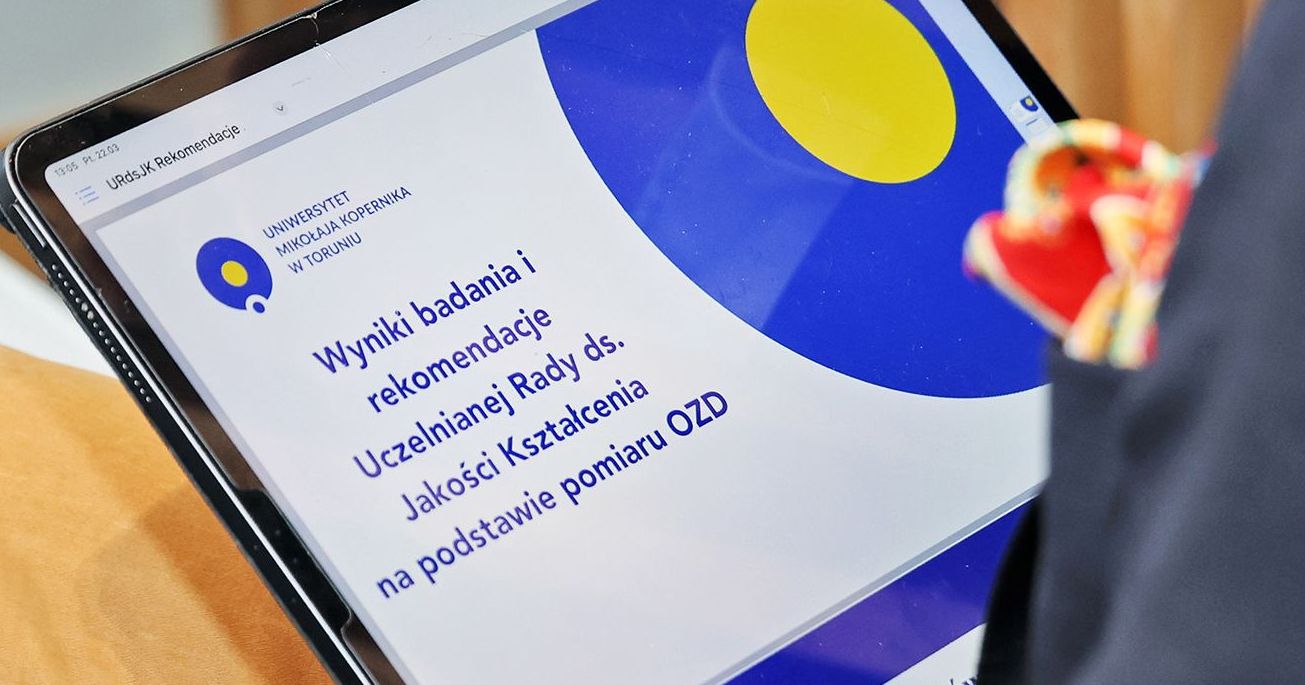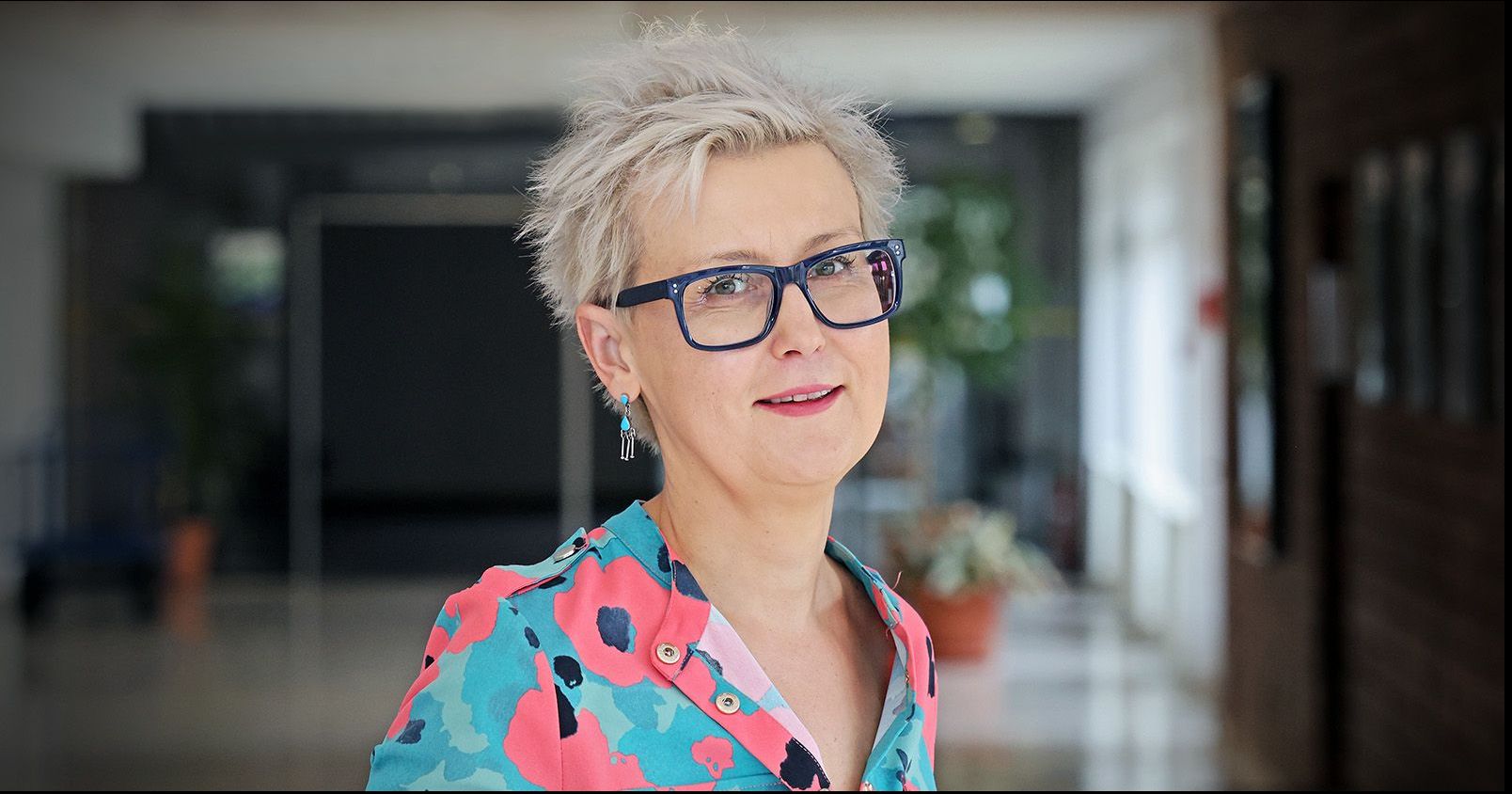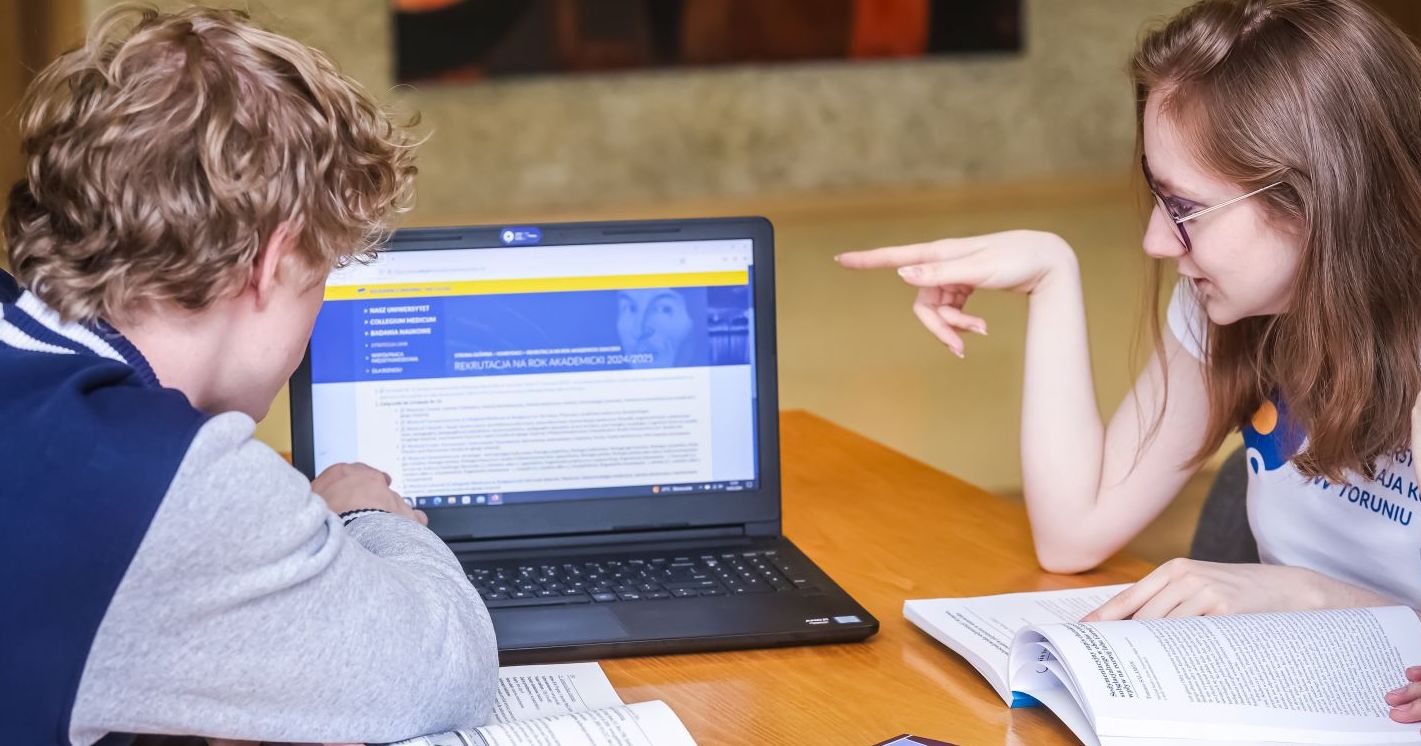 Campus life
Campus life
No university without students
– There is no university without students. Just that and so much more. That is why communication, diagnosis of needs and implementation of recurring comments, both from young people and all employees of our university, are so important. In this way, we will be able to create a comfortable environment for studying and working,' says dr habil. Monika Wałachowska, NCU Prof., Vice-Rector for Student Affairs and Education.
Żaneta Kopczyńska: In order to meet the demands of the student community, the new NCU authorities have reinstated the function of a unified Vice-Rector for Student Affairs and Education, integrating all relevant student and doctoral affairs. After these few months, how is the cooperation with the NCU student community going?
Prof. Monika Wałachowska, Vice-Rector for Student Affairs and Education: I hope that I have gained the trust of the students and doctoral students - that I have and am strengthening it. I very much appreciate the cooperation with the Student Government and the Doctoral Student Government - I think it goes very well. We have had some important and difficult topics, an example being the scholarship system. We have worked in great trust and have managed to find mutually satisfactory solutions.
My door always stands open for students (and not only students). And I make no secret of the fact that they eagerly take advantage of this opportunity; the number of young people and the variety of issues with which they approach me is very high indeed.
In recent years, there has been a clear decline in interest in studying - a trend across Europe and even globally. Figures from a few years ago are of historical value only - twenty years ago there were 1.9 million students in Poland, today there are 700 000 fewer. The NCU has not been spared by this problem either - the decrease in the number of students is clearly noticeable.
This is one of the biggest challenges we face. It is not just us, as it is a problem of higher education as a whole. There are several reasons for this, the first being of course demographic change, but the subject is much more complex and complicated. That is why we are looking at the issue carefully and, in many ways, - we are analysing, looking for solutions and planning their implementation.
The plans are ambitious. You want not only to maintain the number of students, but to increase it by more than 2,000 - the target is 20,000 on both campuses. How do you intend to encourage young people to study at our university?
We are a university with a wide range of disciplines, with more than 100 fields of study - diversity and choice are our great strength and asset. The multiplicity of faculties, disciplines, faculties, staff, student and doctoral groups, living in two different cities of the region, constitute the uniqueness of the Nicolaus Copernicus University in Toruń.
However, we are not just resting on our laurels in this respect; curricula are constantly being revised and upgraded to meet students' expectations. We listen very carefully to the surveys (OZD - Assessment of Teaching Activities - ed.), this is a very instructive material for us. A big role is played by the faculties, which know very well that it is not always necessary to radically change the study programmes or open a new course, sometimes it is enough to change the course profile or launch a new specialisation. Recently, a dozen or so specialisations have been closed, as it turned out that there was no longer any interest in them. Faculties know that they need to focus on something else. We are flexible and responsive, because the world is changing dynamically and we cannot lag behind. However, it is not a revolution, but an evolution.

Enrolment for studies began on 3 June. Recruitment is accompanied by the slogan 'NCU - From here you can go everywhere', which emphasises that studying at the NCU opens doors to careers, fulfilling ambitions, aspirations and dreams fot. Andrzej Romański
Of course, we are launching and will launch new studies as and when required. One example is the degree programme developed as part of the YUFE alliance - Urban Sustainability Studies, with a unique programme that responds to the need for interdisciplinary specialists in urban sustainability. Another - renewable energy sources - is also an interdisciplinary degree programme led by the Faculty of Chemistry, but also involving the Faculties of Physics, Astronomy and Informatics, Biological and Veterinary Sciences, Earth Sciences and Spatial Planning, as well as Philosophy and Social Sciences and Law and Administration. This approach will provide students with a holistic view of the challenges of the energy transition. In turn, at the Faculty of Physics, Astronomy and Informatics, we are launching nanostructure engineering, a modern field where theory meets practice, physics meets chemistry, and computer design meets work in the laboratory. Nanostructure engineering is the study of research and design of materials and devices of the future, these are studies where you can learn to design on a nano scale, i.e. on the scale of individual atoms and molecules. It is also a guarantee of a really good job. When in the near future many professions are replaced by artificial intelligence, a nanostructure engineer will be a valued specialist in innovations and technologies that cannot be easily automated. At the Faculty of Law and Administration, we are also planning to establish a second-cycle study programme - law in business.
All these majors are a response to market demands.
Still, many people value their studies through the prism of future career success and earnings. Given how the socio-economic environment is evolving, it is difficult to forecast what specialisations will be expected and desired in a few years' time. Nevertheless, students clearly indicate that they want to gain at university the hard skills needed for the job market, they want more practice. The modern tendency to acquire practical knowledge is at odds with the idea of a traditional university.
We are not and will not be a school that has a vocational focus. However, we do have quite a few practical courses that give hard skills and competences. The subject is complex, it depends on the specifics of the faculty and the field - it is certainly possible to enrich the programme with a practical aspect in many of them, so it is possible to reconcile the idea of a university related to the transfer of knowledge and more practical education.
Competence modules offered as part of general university courses are an interesting option. The student analyses and decides for themselves which competences they can use and which they want to acquire. We are looking at this carefully, and after the first series is over, we will draw conclusions. We are already noticing some problems - it is sometimes difficult to reconcile the timetables of the faculties so that everyone concerned is able to attend classes in a given module.
Micro-credentials and microcourses will certainly also be a good addition - these are forms of learning that we want to develop and encourage students to participate in. I hope that the Open University offer will also come in handy for those who want to develop and acquire more practical skills. We are also betting on cooperation within the YUFE and more interdisciplinary and educational European projects.
Promoting our university is very important. We rely on going out into the community, on contact with schools. The Open Day at the NCU was an absolute success. Despite the information on the internet, on social media, I think there is still a need for people to see, touch, talk and see that it's just great with us. Our satisfied students can also be great ambassadors for the university and can convince younger friends to study right here at the Nicolaus Copernicus University.
The generation of students entering university now has very different priorities to the young people of even 10 years ago. The offer and study programmes are one thing, but they also have different needs and expectations.
Yes, it is definitely a different group of students. So, we certainly cannot forget to cater for those needs that are not directly related to studying itself.
What may attract candidates to study with us is that we strive to be a university that is open to different people, we want to be seen as a safe and tolerant place, providing a friendly and peaceful environment for living, learning and personal development.
We are aware that the pandemic period has exacerbated certain problems and phenomena, such as those related to building new relationships. Hence there is a large offer of various activities and assistance, including psychological, prepared by the University Centre for Support and Personal Development and Copernican Integration Centre.
Studying conditions are also being improved all the time - from creating relaxation areas for students in individual faculties to making the university more accessible to people with special needs. At times, it may seem like small things - such as replacing the lighting with more friendly lighting for those who are hypersensitive to light. But it shows that we are listening to expectations and needs and trying to meet them.

Dr habil. Monika Wałachowska, NCU Prof., Vice-Rector for Student Affairs and Education and prof. dr habil. Andrzej Tretyn, NCU Rector with students at this year's Piernikalia Student Festival fot. Andrzej Romański
Another thing: students today are working, or at least many of them are. Hence there are expectations of more flexibility and even a hybrid mode of education. We don't impose this on the faculties, but a good practice we follow at several faculties is to arrange the timetable so that each major has one day off per week. In many faculties, lectures are held until 3 p.m., after which classes are conducted in smaller groups. It is more flexible, so it is easier for students to organise their timetable.
We are well aware that in order to be successful in the recruitment field, we must first of all listen to young people and try to understand them. And for this, sometimes we - the staff - also need the right training. In order to learn how to talk to each other and diagnose needs.
We also keep in mind the comfort of working people who come into contact with students. They too want to feel safe in the workplace, they want to improve their competences, especially their soft skills.
And hard ones - such as the use of artificial intelligence tools.
Awareness of artificial intelligence tools and the ability to use them is an extremely important topic. Its use is obvious and necessary, but it should be done responsibly, transparently and based on a set of established and commonly applied principles.
And in this respect, I want to act in two ways. Firstly, through training and workshops, which have already started, we want to show lecturers how to not only use these tools, but also to identify whether, for example, a given course work was created with the support of artificial intelligence and to what extent. Lecturers should also be able to show students how to use artificial intelligence wisely and responsibly, even if only in the context of copyright.
According to some studies, as many as over 50 percent of students use this tool to generate images, music, content. Some practices raise ethical questions, which is why I think it is important to create a code of good practice when it comes to the use of artificial intelligence. Both academic staff and students need and expect this, they want to know the boundaries of what is allowed and what is not, how to label what we have supported with this tool. We will work on this. The law is always a few steps behind reality, but the role of the law - that's how I was taught - is to put reality in order. And we want to put this reality, in which artificial intelligence is present, in order. Developments in technology are forcing some action, we can certainly expect the return of oral examinations to some extent - already some faculties have abandoned undergraduate theses in favour of an oral examination before a board. We are looking for different solutions, we are keeping our finger on the pulse.
Encouraging high school graduates to study at the NCU is one thing, the other problem is dropout. How do we retain talented but unsatisfied students? Their outflow during their studies is considerable.
Dropout is a European-wide trend, and as far as the NCU is concerned it is no higher than at other universities.
We have started research at our university, and various faculties also observe it point by point - a team has been formed to try to diagnose the causes of dropout. We are also applying for the National Centre for Research and Development funds to counteract this phenomenon - the third stage of substantive evaluation of applications submitted in the call for proposals has recently ended. Our project was positively evaluated and moved to the negotiation stage.
The objective of the call for proposals 'Effective university management to minimise dropout' of the National Centre for Research and Development (NCBiR), funded by the European Funds for Social Development 2021-2027 (FERS), is to support universities in carrying out activities to minimise the phenomenon of premature dropping out of education, or so-called dropout. Support was available to HEIs whose projects include, among others, the development of a drop-out monitoring system and the implementation of a support system for students.
Out of 165 applications submitted for the call for proposals, 69 projects from universities from all over Poland received funding, and the Nicolaus Copernicus University in Toruń was placed 14th on the ranking list. The NCU project will now go to the negotiation stage, during which details will be established, including the scope of activities to be carried out and the final amount of funding awarded.
The project prepared by the Nicolaus Copernicus University envisages a number of systemic solutions, including, among others, the development of an action strategy to counteract the dropout phenomenon at the university, a programme of training for staff in tutoring and methodological support, the development of a system for monitoring and analysing drop-outs, the implementation of psychological and counselling support, and making the educational process more flexible.
The project will run from March 2026 to August 2029.
Detailed information on the completion of Stage III of the application evaluation is available on the NCBiR website
We see several reasons for this phenomenon - from the very mundane, such as family reasons, moving house, illness, changing interests, to study conditions, flexibility of study, hybridity. I have already spoken about the latter issues in the case of students - we diagnose, we act, we improve. We have also identified a greater need for individualised study paths: providing tutoring, mentoring, enabling soft skills. It is these things that we hope to be able to fund through the grant programme.
Surveys, interviews, individual meetings and those with the entire Rector's Team- you rely on communication with the university community. How do you encourage those working and studying at the NCU to share their expectations and needs more openly?
We meet, we talk, we listen - the key is to turn recurring comments into action. We want to show that the voice of every person in our community matters, that with it we will be able to improve the quality of education, to improve our comfort level at the university. Good communication and trust is the way to look at how we see each other and to improve conditions for all of us. This is what we strive for.
Vice-Rector for Student Affairs and Education
dr hab. Monika Wałachowska, prof. UMK
1. Supervises the organization of the teaching process at the University, in particular: the organization of full-time, part-time, doctoral, postgraduate studies, education using distance learning methods and techniques, programs, study plans, etc., and also supervises the organization and course of mandatory internships for students and doctoral students.
2. Supervises the quality of education at the University.
3. Coordinates - in cooperation with the deans - the launch of new fields of study, specializations, postgraduate studies and other forms of education.
4. Supervises the settlement of teaching loads of academic teachers and the settlement of teaching classes based on civil law contracts.
5. Supervises matters related to the granting of awards of the Rector for teaching activities and of the Minister of Science and Higher Education for teaching activities.
6. Presents the Rector with opinions on entrusting teaching classes in the form of teaching grants to persons from outside the University.
7. Manages individual cases of students and doctoral students resulting from the implementation of the study regulations, doctoral study regulations and doctoral school regulations, including students and doctoral students who are not Polish citizens.
8. Supervises the documentation of the course of studies of students and doctoral students using the USOS system.
9. In cooperation with the Vice-Rector for Research, supervises the transfer of data to the POL-on higher education information system.
10. In cooperation with the Vice-Rector for International Contacts, coordinates international educational programs.
11. Supervises the organization and course of recruitment for studies.
12. Supervises social affairs and health care for students and doctoral students and matters of students with disabilities.
13. Supervises disciplinary matters of students and doctoral students.
14. Cooperates with the Student Government and the Doctoral Students' Government and student organizations.
15. Supervises the activities of student and doctoral research groups.
16. Provides substantive supervision over: the University Centre for Foreign Languages, the University Secondary School, the University Centre for Support and Personal Development.
17. Performs the function of direct superior in relation to: the Department of Education, the Department for Admissions and Student Affairs, CM Department for Admissions and Student Affairs, the Independent Supervisor for POL-on and USOS Systems.
 NCU News
NCU News






 Campus life
Campus life
 Campus life
Campus life
 Campus life
Campus life